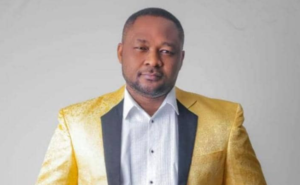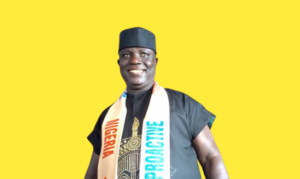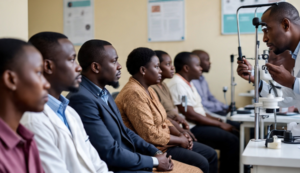An Exclusive Interview With Nwanyi Ocha.
13 min read
Nwanyi Ocha, a very popular Swiss woman married by an Igbo Chief who lives in Switzerland simply addressed as Chief Ezenwa, is someone you would ever like to meet. Her passion in both written and spoken Igbo language is highly amazing. With over 54,000 followers on Instagram and 190,000 on Facebook, almost weekly, people look out to read her new posts on social media. The beauty of it all is that she makes some of her posts in Igbo either video or written.

The way she speaks Igbo and writes the language as well has earned her a large followership among the Igbo across the globe. Her love for her matrimonial hometown, Isuofia in Aguta Anambra State has made the community become popular among her followers on social media.
Last week, Nwanyi Ocha granted an interview to Umuaka Times courtesy of the Umuaka Times correspondent in Switzerland. For over a period of two years, Umuaka Times (www.umuakatimes.com) has chased Nwanyi Ocha for the interview which she eventually approved.
Please read and share with your family and friends. You would enjoy the interview because it is the undiluted Nwanyi Ocha in her own world.
Umuaka Times recommends this interview to every Igbo man or woman alive.
Excerpts:
Please may we meet you? Tell us your name and a little about your background.
My name is Nwanyi Ocha. I was born and brought up in Zürich, Switzerland. I am 35 years old and the mother of 3 kids. I come from a humble background, but always had enough food on the table.
How was growing up like?
I grew up in Zürich, Switzerland. Though it was a very privileged place to grow up, my family was never rich. We did not have enough money to travel abroad when growing up or wear expensive clothes. But I grew up in a save place which I am very grateful.

Considering how you relate with blacks, were you able to mix with blacks a lot when you were a teenager?
No, not at all. In fact, in my school there were no black children. But times are changing. My kids now go to school with other black children and I am grateful for that.
Tell us briefly your experience on the first day you saw a black man.
I cannot remember the exact day. But if by “black man” you mean sub-Saharan African, I believe my first contact with black men was when they opened an asylum center in my town near my school. It was a big drama. Many people were afraid that their children would be harassed by the black men, as the center was very close to a local school. But me I was excited. It felt like a bit of the “outside” world had come to visit me. (The reporter laughs.)
How did you meet your husband Chief Ezenwa?
We met in a Club. Hard to believe that such an encounter could turn into a relationship like ours. But it was just meant to be. Ezenwa fell in love immediately.
Really? what about you?
Me I did not. When he asked me for my number, I answered that if God wanted, that we would meet again (assuming that as a faithful African he would not dare to question my statement and would leave me alone). But when we met two days later coincidentally at a train station outside of Zurich, I could not hold back my laughter.
You mean it was the plan of God?
God just had a plan for us. And after three months of getting to know him, I had to surrender to his charms. (General laughter).
Ok. So before you ever met Chief Ezenwa, what was your impression about Nigerians and Africans abroad and at home?
Well, I grew up with a Moroccan stepfather. So, I would consider myself a little African in as much as a white person can be. But I did have my prejudices with regards to Nigerians.

Please explain better.
The Swiss media usually covers the negative stories about Nigerians, making you believe that they are all drug dealers. Also, women used to complain about how unfaithful Nigerian men were. I have friends that have been scammed by Nigerians so I would say that the fact that Ezenwa was Nigerian did not play in his favor when we met.
What about your first visit to Igboland? How was it like when you got to the place and discovered that the people really live very close to nature?
I loved it and I will always cherish that memory. I just fell in love with Ala Igbo from day one. Lagos was one chapter, and I am sure that I have not seen all of Lagos yet, but I am more drawn to the East. The peacefulness of the village, the family reunions, the fresh food, the smell of harmattan, just everything is so special about the village. Whenever I reach Isuofia, I just exhale and realize that life is beautiful. All the stress leaves my body immediately.
Oh my God. This is amazing. Your love for Igbo people and culture is superb, what really made you develop this love?
It is all because of my husband Ezenwa. He made me fall in love with his people and his culture. I discovered the beauty in the Igbo language, the traditions and the culture. And I see a lot of links to my own culture. I grew up in a big city in Switzerland, far away from remote villages that still uphold the value of culture and traditions. So, seeing how Igbo people neglect their language and cultural values is like a déjà-vue for me. Swiss people have been there, and I realize how important it is to keep remembering your roots.
Do Ezenwa’s relations and village people show you love as well? Can you share an experience?
Ah they do. I am not just Ezenwa’s wife, I am everybody’s wife. If I just put a foot outside of our compound in the village, everybody will come and greet me: “My wife”, “our wife” is what they would call me. I know that they love me for loving their own and that they have accepted me for who I am.

How did you come about the name Nwanyi Ocha?
That is what everybody calls me. If I walk around in the village, or outside, people will turn their head and say Nwanyi Ocha, kedu? (White woman how are you?)
How did you feel about that?
At first, I felt a bit insulted, after all, I do not address a black man in Switzerland as “black man”. But I got used to being called Nwanyi Ocha and decided to use the name for my Social Media accounts as well. I enjoy the fact that my fellow white people do not know about my social media activities at all.
Why?
They cannot even spell, let alone pronounce Nwanyi Ocha. That makes my posts a bit more exclusive and gives me more privacy here in Switzerland.
Now let us go to Igbo language. You have created a consciousness among some Igbo people who do not teach their children the language. You write and speak Igbo very well. What do people tell you when they see you speak and write Igbo?
I am overwhelmed with the positive feedback I am getting. So many people are complementing me for trying to speak Igbo. Sometimes I am surprised. After all, it is just a language. Because Ezenwa for example also speaks German very well. I guess it is just rare for a white woman to have interest in learning Igbo. That is why it may seem special. But if you ask me, this should be much more of a normal thing. If you are in relationship and serious about your partner, why would you not want to learn his language, talk to his family members in their mother tongue. I have learned from a young age that languages can open doors for you. They can make the difference between being a foreigner and belonging. So, it was no question for me to learn Igbo when I got to know Ezenwa. And thank God, he always encourages me.
You are a linguist. Do you agree with those who claim that the Igbo language is very hard to learn?
Unfortunately, yes. I have to say that Igbo is the hardest language I have tried to learn so far. I believe it is because of the pronunciation. Because neither in German, English French or Italian do we distinguish words by the way we pronounce them. Also, the Igbo Alphabet was new to me. Often it just seemed that my brain was programmed the opposite way. For example, if you give me an Igbo text to read, by default I would mispronounce it. So, it took and still takes a lot of practice and patience to get to know how to pronounce words correctly.
In all how many languages do you speak?
Well, my mother tongue is Swiss German. I learned French, Italian, English and Latin in School. So, I manage these languages quite well (except for Latin, because it is not a spoken language and I have not practiced it for long). In addition to that in the past few years I have tried to learn Igbo as much as possible.
Remember Norwegian and Russian languages are also very hard to learn.
Well, I have not tried those languages yet, but I know that German for example is very difficult as well. Which is why I am proud of every foreigner that makes efforts to learn my language!
Are there some white women who come to you to ask you how you managed to learn Igbo?
Yes many. But also many Igbo people who grew up outside of Ala Igbo. Unfortunately, I do not have the perfect answer to that question as me, myself, I am still learning and trying to improve my Igbo skills. I guess it is all about patience and perseverance.
What are the most amazing things you like about the Igbo people?
The fact that you are never bored around them. They always have something to talk about, always a reason to celebrate with my kind of humor. Jokes are important in life, no matter how hard the conditions, it is good to laugh and make others to laugh. Also, the sense of belonging. Ndi igbo, no matter anywhere in the world they are, will always like to meet up and spend time with each other. One could die of loneliness in Switzerland, but not in Nigeria. Never a dull moment where Ndi Igbo are.
Do you eat fufu and garri? If yes, how did you learn it?
See question. My husband eats cheese fondue, why will I not eat fufu? Honestly, food is a habit. I must admit I could not eat Egusi when I first tasted it. It was just like nothing I ever tasted before. Swiss people will either cook fish or meat. Never in my life had I experienced the flavor of both mixed in one dish. But I forced myself to taste a little anytime Ezenwa would prepare it. And with time, I got to love it. Now I cook it for my kids with pride, as if it had been part of me forever.
Your children, how do they feel about Igbo language?
They lack a little confidence to be honest. Though they will understand everything their father is saying, they are shy to speak up. But I believe it will come with time. You must understand that it is difficult for them because most Igbo people will automatically speak English to them, assuming that they do not understand Igbo, which of course does not help the learning process either. My husband and I always have to remind people to talk to them in Igbo.
That is excellent. Now tell us a little about Chief Ezenwa. What kind of man is he?
I have never met a better man in my life.
Eziokwu? Can you explain further?
I am not just saying that because he is my husband. He has suffered a lot when growing up. But he has a forgiving heart. He is a wonderful father that has committed himself to his family and would give his last shirt for a friend in need. He is what we call a workaholic.
Why did you say so?
He is always working because he wants to take care of his family and be there for us. I have never seen a person sleep so little before. I am blessed to have him in my life. The kind of love I get form Ezenwa is out of this world. Sometimes I call him my Hero, because no matter in what situation I would find myself in, Ezenwa would come and save me. But most of all I respect him for standing up for me. It was not always easy for him wanting to marry a white woman.
Because of what?
People were laughing at him, thinking that our relationship would not last, telling him that white women are not meant to stay. But he listened to his heart and defended our relationship against all odds.
How long have you lived together as husband and wife?
We married twice. We had our court marriage in 2012 in Switzerland because I was pregnant with twins and could not travel to Nigeria as planned. Then in 2014, we had our church wedding in Isuofia. But we met in 2008. So, we have been together for 13 years.
Talking about twins, how did you feel when Ezenwa told you that in the olden days, Igbo people were killing twins?
Of course I was surprised to hear that. Especially now that I have realized how much it is considered a blessing to be Mama Ejima in Ala Igbo. But on the other hand, if you look closely you find shameful history in every culture. In Switzerland for example women accused of being involved in witchcraft used to be burned alive in public until 1782. A mere accusation could mean a death sentence, no proper trail or fair judgment. Another shameful chapter of Swiss history is the fact that in some states, women were not allowed to vote until 1990! And I am sure there are many other traditions that we would consider bad today. But it is history and as little as I don’t want to be judged for the habits of my ancestors, I would not judge the Igbos for how they lived in the past.
If you were around then, would you have joined in the intervention to stop the killing of twins?
As a Swiss person with a Swiss cultural background and upbringing, I believe I would.
The people who follow and like you on social media have been expecting you to write a book about Igbo people. Any plan for that?
Maybe. I cannot really say at this point. There are many stories to tell though. Let us see.
The book will be on what?
If I had to write a book today it would be about my kids and their experience and adventures in Ala Igbo. I believe mixed cultured kids are not paid enough attention. They are considered as “blacks” in Switzerland and they are called “Oyibo” in Nigeria. Which is not fair. (General laughter).They have the best of both worlds and should belong as much to Switzerland as I and as much to Ala Igbo as Ezenwa.
Have you read Chinua Achebe’s Things Fall?
Yes I have read it and I loved it.
You have talked about the Igbo in good faith, now if there is an opportunity given to you to correct one thing about Igbo people, what will you correct?
If I had the power, I would encourage people to live their faith more outside of the church environment rather than within. People spend hours in church, morning prayer, lunch prayer, evening prayer, midnight prayer… but neglect their neighbors in need. People pray for things to change, unwilling to take action for change to happen. They prefer paying tithe than to pay school fees. It breaks my heart, because I know that it was my white forefathers that caused all these. It is time Igbo people and Africans generally stop looking at the West as a role model because we are not.
Why?
We have murdered and killed millions of people for our own profit, Igbo people should not make the same mistake.
Do you have any Igbo title? if yes tell us the name of your title?
Yes, I was made Lolo last year when my husband took his Ozo title. So, my title name is Anyanwu Ututu 1 of Isuofia. (The Rising Sun No 1 of Isuofia). Such a beautiful name honestly.
Who gave you the name?
It was given to me by the late mother of a good friend of ours. She just called me like that when she first saw me, and the name has been with me ever since. I am humbled that it is now my official title name and I hope that I will be able to live up to its meaning.
Are you talented in music? I ask this question because some people have been expecting you to release a song in Igbo language or act in Igbo home video.
Not at all! I love music. I could play music 24/7. As a child I always wished to have an orchestra accompanying me when moving around. Like a soundtrack in the movies. Music makes my life so much more beautiful and can cheer me up when you are down. But unfortunately, God has not blessed me with a beautiful voice, so I only sing in the shower and I will surely not release an album.
Tell us the Igbo musicians you like their songs.
I love music. So there are not many musicians whose music I don’t like. But my playlists are full of Igbo artists like Flavour, Phyno, Ruffcoin, Zoro, Bracket, Mr. P, Rudeboy and others. But of course I also enjoy the older music very much, like Osadebe, Oliver De Coque, Fela or Cardinal Rex Jim Lawson.
What of actors and actresses??
I am a bit of old school here. My favorite would be Nkem Owoh (Osuofia), Pete Edochie , Patience Ozokwor or John Okafor (Ibu) but I also enjoy more modern actresses like Genevieve Nnaji or Chioma Omeruah (Chigul). My kids just love Aki and Pawpaw and I enjoy watching their movies with them.
How do you feel when you meet some Igbo families who bluntly refuse to teach their children Igbo?
It pains me to the core. Language is power. As I have mentioned many times in my blog/social media, learning a language is much more than learning vocabulary. You learn about traditions and values of a culture. So depriving children from the Igbo language to me is a crime. Who, if not their parents will teach them about their roots, and you know what happens to trees that do not have solid roots…?
Nwanyi Ocha, thank you very much for this interview. Umuaka Times will interview you again in December when you visit Nigeria. May God keep us alive till then.
Amen.




